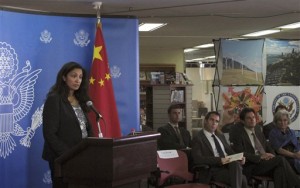China defends human rights record

U.S. Acting Assistant Secretary of State for Democracy, Human Rights and Labor Uzra Zeya, left, speaks to reporters at a news briefing on the latest U.S.-China Human Rights Dialogue Friday, Aug. 2, 2013, in Beijing. The United States is deeply concerned about what it sees as a deteriorating human rights situation in China, with relatives of activists increasingly being harassed and policies in ethnic areas becoming more repressive, senior U.S. diplomat Zeya said Friday. AP Photo/Didi Tang
BEIJING — Beijing says the human rights situation in China is at a historic best, rejecting comments from a senior U.S. diplomat that the rights situation is deteriorating in China, with relatives of activists increasingly being harassed and policies in ethnic areas becoming more repressive.
In a statement issued late Friday, China’s Foreign Ministry said that the Chinese are enjoying unprecedented rights but added those rights must be exercised within China’s law.
The remarks came after the annual U.S.-China Human Rights Dialogue was held Tuesday and Wednesday in the southwestern city of Kunming, and after Acting Assistant Secretary of State for Democracy, Human Rights and Labor Uzra Zeya criticized China on Friday.
Zeya, who led the U.S. delegation at the talks, said U.S. diplomats “conveyed our deep concern about attempts to control and silence activists by targeting family members and associates of the activists.”
“This is a worrisome trend, and one which we have raised at senior levels with the Chinese government,” she said, adding the dialogue fell short of Washington’s expectations.
Article continues after this advertisementRights watchers have been alarmed by the targeting of relatives of high-profile dissidents, including blind lawyer Chen Guangcheng, who exposed abuses in the enforcement of China’s one-child policies, and Nobel Peace laureate Liu Xiaobo, imprisoned since 2009 on subversion charges after he campaigned for peaceful democratic change in China.
Article continues after this advertisementChen’s relatives have been harassed in their hometown in Shandong province. Liu’s wife has been placed under house arrest in Beijing and her brother recently was sentenced to 11 years in prison over a business dispute, a stiff penalty in what supporters say is a vendetta against the family for Liu’s activism.
Zeya said U.S. officials questioned the pattern of arrests and extralegal detentions of China’s public interest lawyers, Internet activists and others who challenge official policies in China.
“We know that such actions are contrary to China’s international obligation and, indeed in most cases, China’s own laws and constitution,” she said.
Zeya said the U.S. raised specific cases of individuals who are imprisoned, detained or under house arrest, including activists Xu Zhiyong, Gao Zhisheng and Ni Yulan, several Tibetan, Uighur and Mongolian activists, as well as Liu and his wife. Zeya said the Americans were able to get some information on the cases, but she did not reveal details.
On Friday, a Chinese journalist, Xiaoshu, was forcibly taken out of Beijing for his public support of Xu.
Xu, who champions building a stronger civil society through his New Citizens Movement, he is in police detention on suspicion of gathering people to disturb public order.
Beijing has repeatedly rejected U.S. criticism of China’s human rights record, saying Washington is biased and distorts the situation.
“China opposes U.S. intervention of Chinese judicial system through individual cases and wishes the U.S. would respect China’s judicial sovereignty and stop its practice of badgering with individual cases,” the Foreign Ministry said.
Wang Dong, associate professor at Peking University’s School of International Studies, said having a dialogue is better than no talks, even though the two sides have sharp differences and there was no breakthrough in the latest dialogue.
“It’s a way to increase mutual understanding,” Wang said, adding the talks have led to more common ground between Beijing and Washington than two decades ago.